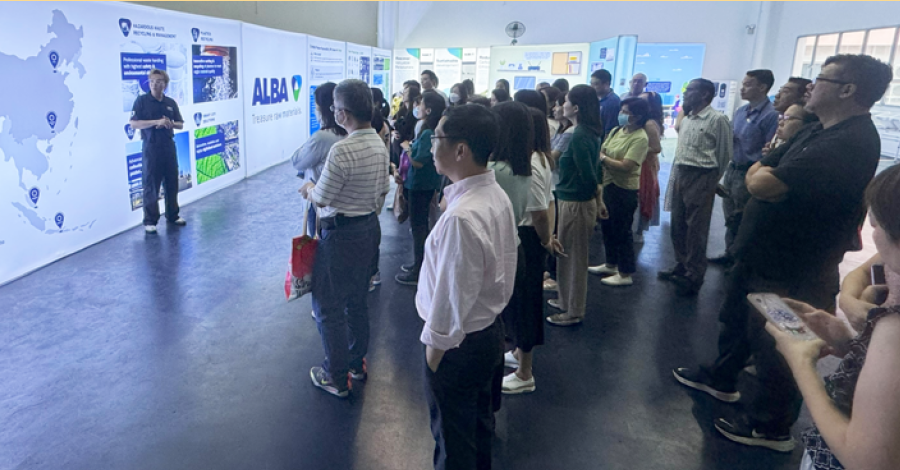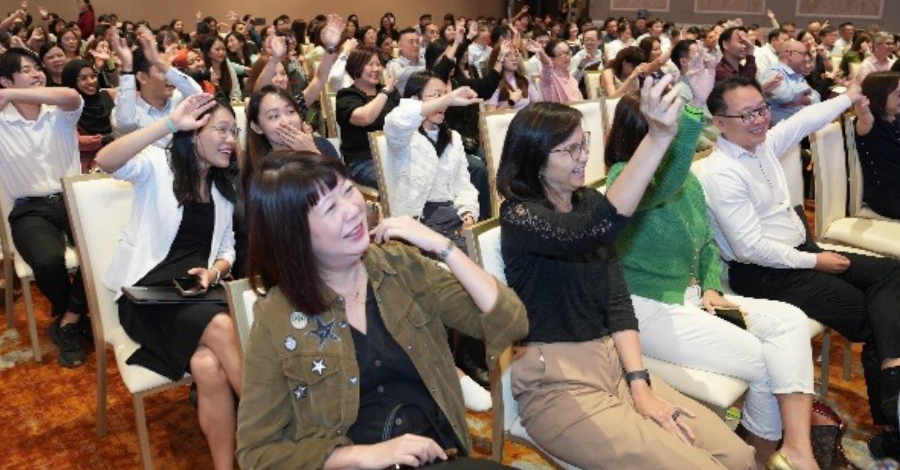MINIMISING ENVIRONMENTAL IMPACT ON OUR COMMUNITIES
The Company is dedicated to mitigating the negative impact of our developments. We are also committed to complying with all applicable EHS legal requirements enforced by local authorities. Through constant monitoring, evaluation and auditing of our ISO 14001 and ISO 45001-certified EHS management systems, the Company actively ensures that all our activities and operations comply with existing regulatory requirements.
Managing Water Discharge at Construction Sites
The discharge of wastewater into the public sewerage system and open drains, canals and rivers is strictly regulated by PUB and NEA. To ensure that the Total Dissolved Solids (TDS) and Total Suspended Solids (TSS) readings of the discharged water do not exceed the legal limit of 1,000 mg/litre and 50 mg/litre respectively, the Company works closely with our contractors to track and manage the quality of water discharged into public sewerage and drainage systems. At our construction sites, Earth Control Measures (ECM) are implemented to prevent silt from polluting our waterways. In cases of exceeded TSS readings, prompt corrective actions are taken to rectify the issue.
| 2020 | 2021 | 2022 | 2023 | 2024 | |
| Highest TSS (mg/litre) | 49 | 40 | 31 | 32 | 18 |
Managing Vector and Pest Control at Construction Sites
The Company works closely with our main contractors to ensure that effective systems are in place to prevent pests and curb dengue transmission around our worksites.
The ISO 45001 occupational health and safety management system and CDL 5-Star EHS Assessment provide a risk management framework to identify and mitigate the risks associated with vector and pest control at construction sites. Apart from ensuring that our contractors schedule and conduct regular housekeeping on-site, we require that they maintain comprehensive pest surveillance and control programmes. We actively engage our contractors and their workers through awareness-building, senior management site visits and educational talks to ensure effective vector control and minimise incurring fines for vector breeding.
Managing Impact on Communities
We provide avenues for the public to raise enquiries or feedback on EHS-related matters. Hotlines managed by our appointed main contractors are made publicly available at all construction sites. Upon receiving EHS-related feedback such as dust or noise disturbance impacting the community, the site management will implement controls in the surrounding area to address the feedback to mitigate likelihood of further incidences.
In Singapore, NEA regulates the noise levels from construction sites, with a set of permissible noise limits that vary depending on the time of day and type of neighbouring premises. To protect the well-being of nearby residents, our main contractors must comply with the noise limits at all our construction sites. To minimise noise-related complaints, our main contractors are encouraged to implement an active management programme and undertake necessary actions to address related complaints. Schedules of the progress at each site are also communicated to the community to apprise them of upcoming works.
Educating Employees on Environmental Management
Environmental awareness and training for employees are catalysts for positive change. We have designed sustainability-related training for our employees covering topics such as management of energy, water and waste to build awareness on environmental issues.
In 2024, as part of the Group’s initiative to educate employees on waste management, we delivered content on responsible waste management and disposal techniques for waste generated from our construction sites and managed buildings.
In 2024, staff from the Company participated in guided tours to Semakau Landfill and ALBA E-Waste Smart Recycling Hub to learn about waste and e-waste recycling in Singapore. Another group visited Samwoh Corporation to learn about sustainable construction materials, roadworks and recycling solutions. In October 2024, nearly 300 employees across the Group attended a Group-wide seminar on green building, decarbonisation and safety, which included a dedicated topic on waste management by NEA. These trainings reinforced the importance of responsible waste disposal, segregation and recycling and most importantly, encouraged the adoption of a ‘waste less’ mindset.
| Indicator | Unit of Measurement | 2020 | 2021 | 2022 | 2023 | 2024 |
| Total number of EHS related non-monetary instances of non-compliance (i.e. SWO) | Number | 1 | 1 | 5 | 4 | 0 |
| Total number of EHS related fines and value | Number ($) | 10 (73,500) | 4 (25,200) | 8 (79,500) | 7 (70,000) | 81 (50,900) |
| EHS Related Fines: CDL Managed Properties | Number | 2 | 1 | 0 | 0 | 1 |
| EHS Related Fines: CDL Construction Sites | Number | 8 | 3 | 8 | 7 | 7 |
| 1 | Eight EHS related fines were imposed on CDL’s main contractors across construction activities and managed properties including noise levels above limits while environmental fines were imposed for vector control and water discharge. One fine received in 2024 was associated with a case in 2019. |

